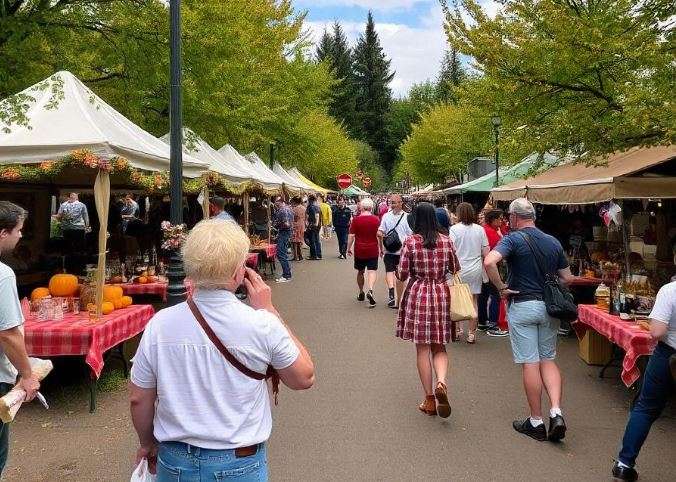Oktoberfest is one of the world’s most famous festivals, drawing millions of visitors to Munich, Germany, each year for beer, food, music, and celebration. While it’s deeply rooted in Bavarian culture, the festival’s appeal has become global, inspiring similar celebrations across Europe and beyond. Here’s everything you need to know about Oktoberfest, its traditions, and its international influence.
When Does Oktoberfest Begin in Munich?
Despite its name, Oktoberfest usually begins in September. The 2024 edition of Oktoberfest will kick off on Saturday, September 21, and will run until Sunday, October 6. Traditionally, the festival begins on the first Saturday after September 15 and ends on the first Sunday of October, with some years extending into the first few days of October.
Oktoberfest in Munich lasts two weeks. It starts with the ceremonial keg tapping by Munich’s mayor and the famous exclamation, “O’zapft is!” (“It’s tapped!”), officially launching the festivities. From that moment on, beer flows freely in the vast tents spread across the Theresienwiese festival grounds.

While Austria doesn’t have an official Oktoberfest on the same scale as Munich, the Bavarian tradition has certainly crossed the border. Austrian cities, particularly those close to Bavaria like Salzburg, host smaller versions of the festival with a similar spirit of beer, folk music, and traditional food. These events often incorporate local Austrian customs, but the overall vibe mirrors Munich’s Oktoberfest.
Austria has its beer festivals throughout the year, and during Oktoberfest season, many Austrian bars and beer halls will host themed events. So, while Austria may not celebrate it in the grand fashion of Munich, the festival’s influence is certainly felt across the border.
Why Do They Call It Oktoberfest?
The name “Oktoberfest” dates back to the origins of the festival in 1810, when it was first held in mid-October to celebrate the marriage of Bavarian Crown Prince Ludwig and Princess Therese of Saxe-Hildburghausen. The original celebration was a grand public event featuring horse races, food, and drinks, with an emphasis on community and festivities.
In the years that followed, the festival became an annual tradition, gradually moving into September to take advantage of the milder weather, but the name “Oktoberfest” stuck. Today, it’s a global symbol of Bavarian culture, even though the festival mainly takes place in September.
Seollal: Hanboks, Bowing, and Blessings Rich Traditions of Korean Lunar New Year
Getting a table at Oktoberfest can be one of the most sought-after experiences for attendees. Prices for reserving a table can vary depending on the tent, day of the week, and time of day. Most reservations are for groups of 8 to 10 people, and the cost typically includes food and drink vouchers.
On average, a table reservation can cost between €300 and €500 for a daytime spot during the week, while evening and weekend reservations can climb to €1,000 or more. The cost per person generally covers a few liters of beer and traditional Bavarian dishes like roast chicken or pork. However, reservations aren’t always necessary — many tables in the tents are left unreserved and are available on a first-come, first-served basis.
What Is the Significance of Oktoberfest?

Oktoberfest is much more than just a beer festival. It’s a celebration of Bavarian culture and traditions, serving as a showcase for the region’s heritage, music, food, and, of course, its world-renowned beer. The festival reflects the spirit of community and hospitality, bringing people from all over the world together to enjoy Bavarian customs.
One of the festival’s most important traditions is the Reinheitsgebot, or the German Beer Purity Law, which dates back to 1516. Under this law, only beer brewed within Munich’s city limits, and adhering to strict purity standards, can be served at Oktoberfest. This law highlights the pride Bavaria takes in its brewing history.
This festival also has significant economic and cultural importance for Munich and Bavaria. Each year, it generates significant revenue for local businesses and creates jobs for thousands of people.
Beyond the beer, this showcases Bavarian music, parades, and traditional clothing like lederhosen (for men) and dirndls (for women), making it a full-fledged cultural event that offers something for everyone, whether or not you’re a beer enthusiast.
It is an internationally beloved festival with roots deeply planted in Bavarian culture. Starting in late September in Munich, it’s a celebration of beer, community, and heritage, offering an unforgettable experience for millions of attendees each year. While Austria hosts smaller, regional celebrations, the heart of Oktoberfest beats strongest in Munich, where the tradition began over two centuries ago. Whether you’re securing a table in one of the grand beer tents or simply soaking in the atmosphere, Oktoberfest is an event rich in tradition, unity, and festivity.

